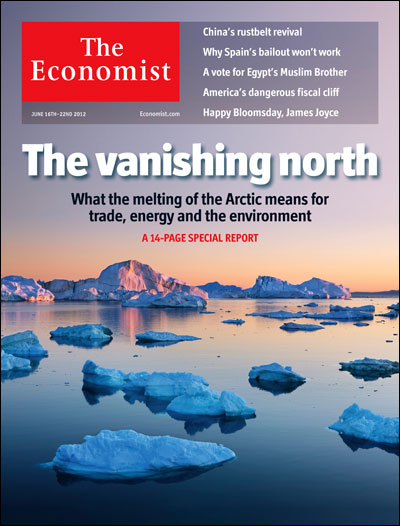Deficiency of Cultural Sensitivity in The Economist

The vanishing north – Special Report on the Arctic. Photo: The Economist
I commend the excellent reporting and well-informed perspectives put forth in most of The Economist’s Special Report on the Arctic published on June 16th. The majority of the work constitutes the type of reasonable and nuanced press coverage of current developments in the Arctic that is generally wanting in the ever-increasing media attention towards the region. However, I must express my dismay with the gross cultural insensitivity displayed in the piece on Inuit in Greenland titled “One man and his dogs“. I recognize that The Economist does not purport to be an anthropologically centered publication, nor can its reporting staff necessarily become cultural experts on every group of people and region of the world for which they provide news coverage. Nevertheless, the appalling use of cliché and dearth of basic knowledge about Inuit culture and history are unacceptable, even if unintentional, in a publication of The Economist’s caliber.
First, in an attempt to portray the gravity of the impact of climate change on Inuit culture, the article points out that “no sea ice means no seal hunt, which can mean no meat for sled-dogs.” In doing so, it both eclipses the heart of issue at hand, while at the same time insulting indigenous traditions. Indeed, no sea ice means no seal hunt – but it’s certainly not the welfare of sled-dogs that is the most concerning consequence of that possibly tragic situation. Rather, it is the potential loss for the many Inuit men, women and children who continue to include seal as a core component of their diet, for both nutritional and cultural reasons, that is most alarming. To highlight how the declining ability to hunt seals impacts sled-dogs rather than people illustrates either a lack of understanding of a typical traditional food based Inuit diet, or an outsized, but not uncommon, concern with the plight of Arctic animals over Arctic human beings.
Later on in the article the author declares that, apart from in Russia, “the Inuit—by the admittedly miserable standards of indigenous peoples—are pretty well off.” This statement misses an opportunity to illuminate the major disparities in standard of living between indigenous and non-indigenous peoples in the Arctic even outside of Russia, and rather perpetuates the mainstream attitude of ignorance. It is time that the non-indigenous, Western world, particularly authors in well-regarded, “enlightened” publications, stop measuring the well-being of indigenous people by a different set of standards. That one indigenous group is marginally better off than another is not a legitimate reason for classifying them as “pretty well off” while ignoring the blatant truth that their standard of living is by and large unjustly misaligned with the standards of developed nation-states in which they reside.
The author then claims that “Because Europeans came late to the Arctic, the Inuit got rights, not smallpox-infected blankets.” Even disregarding the juvenile “smallpox-infected blanket” cliché that the author uses to sum up the relationship between Europeans and Native people, the implication that Inuit simply “got rights” and somehow escaped the devastation brought by Europeans in myriad ways is outrageous. I would urge the author, or anyone who is unfamiliar with Inuit history, to look into the history of Inuit who were made into traveling entertainment displays by Europeans, who were sent away to horrific residential schools, or who were forced to relocate by their federal governments in more than one instance, just to name a few of the trials that Inuit have endured at the hands of Europeans. Unfortunately, many instances of these deplorable events happened even after the Inuit had so-called “rights”.
Ironically, one cultural element that the author does include in this article is his/her comment that Inuit “are also suffering a wider cultural decline that shows up in a high incidence of alcoholism, obesity and suicide”. Yet, it seems that he or she is unable to understand, or at the very least fails to portray, the connection between this cultural decline and the difficulties and suffering that Inuit have withstood first through unsought contact with Europeans, then through the resulting monumental and expedited changes in lifestyle because of this contact, and finally through the widespread treatment (whether official or inadvertent) of Indigenous people as second-class citizens.
Finally, the author ends the article with a quote from an Inuk man on a point regarding a potential influx of immigrant workers to Greenland: “Chinese people are not the same as us,” concedes London Mining’s Nuuk representative, Kaj Kleist, “even though they look like us.” To include the classic base stereotype that Inuit look like Chinese people in this article, even if it is in the words of a native man, is to simply reinforce an ignorant judgement for no apparent purpose. Not to mention, the fact that Kleist “concedes” that Chinese people look like Inuit, and moreover has to explicitly state that they are not the same, leads one to believe that he was prompted by a tasteless inquiry from the aloof author.
Surely the author of this article did not explicitly intend to insult Inuit or to undermine their heritage and their current struggles. On the contrary, at surface level it seems the author thought that he or she was presenting a sympathetic, well-rounded cultural exposé as a part of the larger Special Report on the Arctic. Unfortunately, a non-indigenous, Western perspective appears to be so deeply ingrained into the author that he or she could not escape the use of cultural stereotypes and was unable to consider the subject from a perspective other than his or her own worldview. I again extend my admiration to The Economist for an excellent report on the whole, however I would strongly urge them to strive for a higher degree of cultural sensitivity in the future.